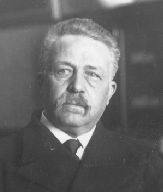Gaetano Mosca facts for kids
Quick facts for kids
Gaetano Mosca
COSML, COCI, SoK
|
|
|---|---|
 |
|
| Member of the Italian Chamber of Deputies for Palermo |
|
| In office 24 March 1909 – 29 September 1919 |
|
| Constituency | Caccamo |
| Personal details | |
| Born | 1 April 1858 Palermo, Two Sicilies |
| Died | 8 November 1941 (aged 83) Rome, Italy |
| Political party | Historical Right |
| Alma mater | University of Palermo |
| Profession | Teacher, journalist |
|
Philosophy career |
|
| Era | 20th-century philosophy |
| Region | Western philosophy |
| School | Italian school of elitism |
|
Main interests
|
Politics, economics, sociology |
|
Notable ideas
|
Political class, political formula (a set of doctrines propagated by the ruling elites), elite theory |
Gaetano Mosca (1 April 1858 – 8 November 1941) was an Italian political scientist, journalist, and public servant. He helped create the idea of the elite theory and the concept of the political class. He is one of the three main thinkers of the Italian school of elitism, along with Vilfredo Pareto and Robert Michels.
Contents
Gaetano Mosca: A Life in Politics
Mosca was born in Palermo, Italy, in 1858. He studied law at the University of Palermo and finished his degree in 1881. After university, he moved to Rome in 1887. There, he worked as an editor for the official records of the Chamber of Deputies of Italy.
From Professor to Politician
Mosca taught at universities in Palermo and Rome. In 1896, he became a professor of constitutional law at the University of Turin. He held this job until 1924. Then, he moved back to Rome to teach public law at the University of Rome.
In 1909, Mosca was elected to the Chamber of Deputies of Italy. This is like being a member of parliament. He served there until 1919. During this time, he also worked as a political journalist. He wrote for important newspapers like the Corriere della Sera and the Tribuna.
Mosca's Views on Government
Mosca believed that in any society, a small group of people always holds the power. He called this group the "political class." He thought that even in democracies, a small group would still lead.
He was careful about pure democracy. He believed that power should not come from just one source, even if it was from elections. He felt that too much power in one place could become unfair or oppressive.
Standing Up to Dictatorship
In 1919, Mosca became a life senator for the Kingdom of Italy. He actively served in this role until 1926. During this time, Italy was facing a new political movement called fascism, led by Benito Mussolini.
Mosca was brave and spoke out against Mussolini's plans. These plans aimed to take away political rights and weaken the parliament. Mosca believed in political freedom and representative government. He argued that these things helped nations grow and progress.
His speeches against fascism were very important. They inspired other thinkers who were also against Mussolini's rule.
Understanding Mosca's Political Ideas
Mosca's most famous idea is that a small group, a "numerical minority," always rules society. He called this group the political class. This means every society has two main groups: those who rule and those who are ruled. He believed this was always true because a society needs a ruling group to function.
The Elite and How They Rule
Mosca's idea is often called "elitist." However, he saw elites differently from some other thinkers. He thought modern elites were good at organizing things. These skills were very helpful for gaining power in modern bureaucratic societies.
Mosca also believed that elites were not always born into power. People from any part of society could become part of the elite. When new people join the ruling group, he called this "democratic" power. If the same families or groups kept power, he called it "aristocratic."
The Circulation of Elites
Mosca also talked about the "circulation of elites." This idea suggests that different elite groups are always competing for power. They take turns leading society over time. He saw history as a constant struggle between groups for power. He believed that society would always have this two-part structure, with a ruling group and a ruled group.
His Important Books
Gaetano Mosca wrote several important books about political theory:
- Sulla teorica dei governi e sul governo parlamentare (Theory of Governments and Parliamentary Government), published in 1884.
- Elementi di scienza politica (The Ruling Class), published in 1896.
- Storia delle dottrine politiche (History of Political Doctrines), published in 1936.
Works in English translation
- The Ruling Class, McGraw-Hill Book Company, Inc., 1939.
- "On the Ruling Class." In Talcott Parsons, ed., Theories of Society; Foundations of Modern Sociological Theory, Vol. I, Part Two, The Free Press of Glencoe, 1961.
- "What is Mafia." M&J, 2014. Translation of the book "Cosa è la Mafia," Giornale degli Economisti, Luglio 1901, pp. 236-62.
See also
 In Spanish: Gaetano Mosca para niños
In Spanish: Gaetano Mosca para niños
 | Shirley Ann Jackson |
 | Garett Morgan |
 | J. Ernest Wilkins Jr. |
 | Elijah McCoy |

